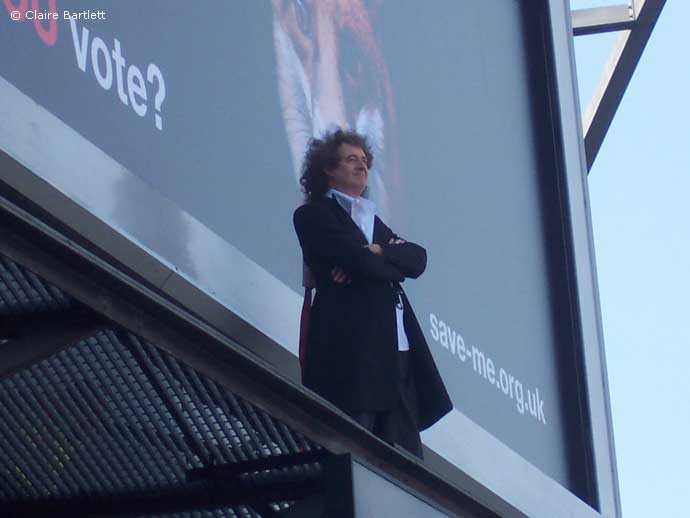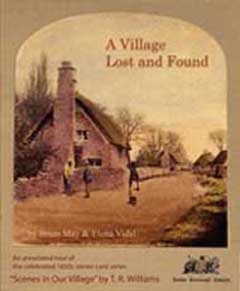CBC NEWS
29 July 2010

Brian May of rock band Queen poses in front of
an animal rights billboard in London on April 13.
His newest project is the book A Village Lost and Found.
Rock star, astrophysicist and animal rights activist Brian May has revealed a new obsession — stereo photographs.
May, the guitarist and songwriter for British rock ‘n’ roll icons Queen, has co-written a book that pulls together a group of 3-D photos dating from the 1850s that were taken by gentleman photographer T.R. Williams.
Williams became a huge star in his day through stereoscopy, a technique that presents a 3-D image to the viewer, similar to the kind of image you would see in a Viewmaster.
May, who surprised music fans by finishing his PhD thesis on space dust in 2007, 30 years after he had begun it, said he has been interested in stereoscopic pictures since he was nine.
Music had led him down another path, but a few years ago, he began research that led to this book, A Village Lost and Found, he said in an interview Thursday with CBC’s Q cultural affairs show.
“I’ve been searching for the particular photographs for 40 years and this is the first time that all of these photographs in this series have appeared in one place,” said May, who added he’s as passionate about this collection as he is about songwriting.
 A Village Lost and Found by Brian May
A Village Lost and Found by Brian May
and Elena Vidal pulls together a group
of 3-D photos dating from the 1850s
that were taken by T.R. Williams.
(Frances Lincoln Publishers)
A Village Lost and Found reproduces for the first time all 59 of Williams’s largely forgotten images of an idyllic English village in the 1850s, with villagers going about their life and work.
For Williams, it was a “labour of love,” May said. “I think he went back there because he’d spent part of his childhood there and regarded it as a kind of lost idyll — an idealistic way of life,” he said. “I think he was documenting a way of life he regarded as precious and that he believed was disappearing, was endangered by the Industrial Revolution.”
For May, Williams pictures were a bit of a mystery as he didn’t know where they had been taken or why he bothered to take such beautiful images of quite ordinary lives. He found out by placing an image of a church on his personal website and offering a prize to anyone who could identify where it was.
“Within 36 hours, I had six answers and they were all right,” he recalled.
Book celebrates photos
The church was in the village of Hinton Waldrist in Oxfordshire, and May and his co-writer ended up visiting the place — still beautiful but somewhat changed since the 1850s — dozens of times in researching the book and finding every site that Williams had photographed.
The book May has created celebrates those photograhs, with a viewer to capture the stereoscopic effect, but also discusses stereoscopic photography itself.
May says the process “presents the left eye with a left eye image and presents the right eye with a right eye image, and your brain is able to do its normal magic. You get the illusion of being there in three dimensions.”
May and Vidal also write about Williams’s life and the era he feared would disappear as he photographed the last spinning wheel in Hinton Waldrist.
‘Reached out for life’
May is unapologetic about this new passion, saying it is an extension of what he takes from making music.
“I’ve never been an archetypal rock star; I’ve reached out for life in all its colours,” he said.
The book, which May admits he could have gotten published solely on his rock ‘n’ roll reputation, has had a fourth printing in the U.K., despite the somewhat arcane subject matter.
May is still in the music business. He says he has no plans to tour again as he did in 2008, but is producing an album, Anthems, by Kerry Ellis, a British singer and actress. He has written songs for the album and plays guitar.
He also spoke out prominently earlier this year on protecting the badgers of Britain, which a farm group wants to cull on the grounds they carry bovine tuberculosis, and end the foxhunt.